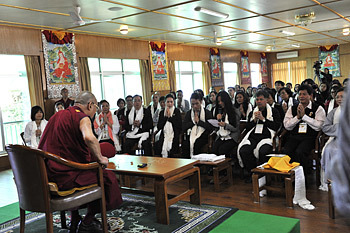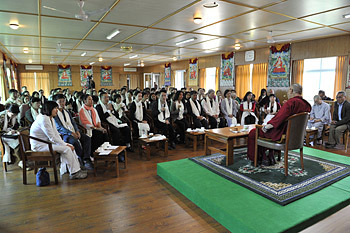Thekchen Choeling, Dharamsala, 24th September 2012 - A group of 102 visitors from Vietnam, about half from the North and half from the South, members of the Vietnamese CEO's Club, had a meeting with His Holiness the Dalai Lama today, during which he encouraged them to ask him questions. They recalled that it is a year since His Holiness first gave teachings to interested people from Vietnam. On this occasion, however, they said they were looking forward to hearing his advice on how to lead a meaningful life. His Holiness began in his customary way,
“I always have a feeling when I meet people like this that on a human level we are all the same, there are no differences between us. Whether we are Tibetan or Vietnamese, we are all born the same way and when the time comes we die the same way. We have the same kind of emotions, anger, attachment and jealousy, but we also have the same potential to develop love and compassion. Most important, both you and I want a happy life and we have the same right to achieve it. On this sort of level, there are no differences between human beings, so there is no point in our quarrelling with each other.
“ When we insist on emphasising differences like race, religion or ideology the result is divisions that can even lead to our fighting and killing each other, as happened during the war in Vietnam. It is this focus on secondary differences that I believe is why so many of our problems can be seen as man-made. I like to point out that our nature is basically compassionate because we are social animals. What brings us together is love and affection. So, stressing the oneness of humanity is my first commitment; but I don't want to be boring like a communist party leader going on and on. I'd prefer we have a discussion.”

|
His Holiness answered a question about how to deal with life's struggles saying that struggle is part of our lives. However, it makes a difference if the struggle is for good not harm, is not only for personal gain to the neglect of others' welfare and is achievable. Once we establish that, we need to be determined and approach it from a realistic point of view, which means we have to employ our common sense and intelligence.
A mother of three children wanted to know how to make life easier for them than it had been for her at their age. His Holiness joked that he had no experience of bringing up children and was too old to start now. He has learned from friends who have such experience that children need to be taken care of, they need affection and they need those who give it to be constant and steady.
With regard to dealing with those who obstruct what we are trying to do, His Holiness said that it is important to find out if they are acting out of ignorance or deliberately. If they are not aware of the problems they are putting in your way, you may be able to explain it to them. However, if they are being deliberately obstructive, you may have to take counter measures, but do so not out of anger, but with a positive motivation. He gave the example of Tibetans struggling for justice in Tibet, opposing Chinese actions, without cultivating anger or hatred for them.
Another questioner wanted to know how religious practice affects living a meaningful life. His Holiness replied that it is not necessary to be religious to live by positive human values, which are the basis of what he calls secular ethics. A simple illustration of this is that the key to family happiness is warm-heartedness. Although there are those who believe ethics must be rooted in religious faith His Holiness feels that this is too limiting because the majority of the world's 7 billion people don't have enough time to take religion seriously.
“ Nowadays, people think the source of happiness is money and material goods, but it is also clear that in the US and Europe where the standard of living is high and many people are wealthy, too many of them are unhappy inside, racked by suspicion and jealousy. What's more, crime and suicide rates are remarkably high. The solution is not to become more religious, but to develop a warm heart. Happiness is based on trust, while the opposite of trust is fear. We absorb affection when we are infants in our mother's care, which is why we have the potential to show affection to others. But if members of a family don't trust each other, how can they be happy together? A lack of trust leads to loneliness, depression and seeking solace in drugs and alcohol. On the other hand if you have self-discipline and people are prepared to share, it's possible to build a happier society.“
Admitting to an admiration for Marxist economics, particularly the idea of equal distribution of wealth, His Holiness made it clear that he was firmly opposed to totalitarianism, that while he might be a Marxist, he is not a Leninist. Continuing in the afternoon to discuss the compatibility of Marxism with Buddhism he agreed that Marxism is a materialistic doctrine with no talk about mind or past and future lives. However, what it shares with Buddhism is the sense that destiny is in our own hands. A happy society must be created by people themselves, not through prayer alone, but by taking action. Action is the cause of happiness and the distinction between positive and negative action depends largely on our motivation. Buddhism teaches us to change our minds, to change our attitudes and so transform our actions. His Holiness laughed as he told his listeners what he recently told some visiting Chinese,
“The Tibetan spirit comes from Buddhism which is a more than 2500 year old tradition in which interest is growing, your system, Chinese communism, is based on ideas that are barely 200 years old and whose influence is declining.”
With regard to the relation between the mind and body, His Holiness explained that some scientists have begun to see that there are circumstances in which changes in the mind change the brain and have documented this. More and more scientists are showing interest in the mind, in tackling the emotions. In this connection their interest in what Buddhism has to say is growing. Buddhism describes different levels of mind, the sensory consciousnesses which depend on the brain, but also a more subtle level of mental consciousness. Buddhism does not talk about a soul, but

|
acknowledges the existence of a self that is designated on the continuity of the mind. His Holiness mentioned evidence of the existence of the subtlest levels of mind when accomplished meditators enter a subtle state of meditation after physical death has taken place, during which their bodies remain fresh. He said that scientific investigation of this phenomenon has begun, but investigators are hampered by not knowing when or where the next case may take place for them to examine. He laughed saying,
“We can't very well ask someone to die just so we can test what happens afterwards. And then what would we do if they did die but didn't manage to enter the subtle meditation state?”
His Holiness's advised,
“ We need to be 21st century Buddhists. Buddhist practice is to use our intelligence to the maximum to transform our emotions. For this knowledge is very important. Western scholars often suggest that Buddhism is not so much a religion, but more a science of mind. The concept of emptiness of intrinsic existence is also important. When we investigate reality, we cannot find something independently, intrinsically existent. Ignorance, our misconception about reality, is the basis of our destructive emotions. The counter force is reason, taking a scientific approach to correcting our view.”
One of the Vietnamese group asked about current tensions between Vietnam and China over the Paracel and Spratly Islands off both their coasts. He wanted to know if Vietnamese anger and indignation would be effective in resolving the dispute and suggested that many people would like to invite His Holiness to come and establish a monastery or temple on one of the islands. His Holiness replied that anger would not help, anger would not affect the Chinese mind. It would be far better to try to influence them by friendly means, which is not to say that this can't be done from a position of toughness. He acknowledged that in 1979 when China sought to teach Vietnam a lesson they were faced by a tough, battle hardened Vietnamese army. He concluded,
“Actually, I don't especially favour constructing a monastery or temple, I'd prefer to see an academic centre of learning instead, somewhere that could be a focus for the study of Buddhist philosophy, Daoism and secular ethics. I recently told people in Ladakh that they should aim to make their monasteries centres of learning. And if such a centre can be set up, it might be better in Saigon or Hanoi than on one of these islands. Thank you, see you tomorrow.”














